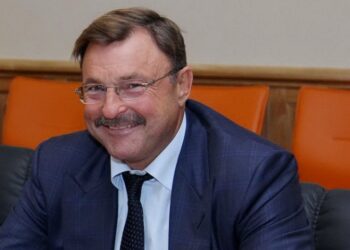The trial in a new criminal case of the former governor of the Kirov region Nikita Belykh on abuse of office is entering the final stage. To the existing 8 years of imprisonment for a bribe, he can be added another four years.
Meanwhile, it turns out that the funds that appear in the case were transferred to JSC Kirov Regional Mortgage Corporation (KRIK) from Vyatka Bank Grigory Guselnikov and JSC OKHK Uralchem. Could they have anything to do with the crimes that Belykh is charged with?
Details – in the material of the correspondent of The Moscow Post in the Kirov region.
In the criminal case, we are talking about two episodes. In the first, Vadim Perminov, general director of Kirov Regional Mortgage Corporation JSC, concluded a loan agreement with OKHK Uralchem JSC, which is controlled by oligarch Dmitry Mazepin, for 320 million rubles secured by apartments from the specialized housing stock of the region. According to investigators, he did this with the instructions of Nikita Belykh, although formally he did not have the right to give such orders.
As a result, after Belykh was imprisoned for a bribe, the creek went bankrupt, the funds had to be given from the money received for the sale of apartments that fell into the bankruptcy estate of the corporation – the damage exceeded 440 million rubles.
In the second case, we are talking about a loan of 320 million rubles received from the same Uralchem. However, instead of the corporation, the money went completely the other way – to pay debts to PJSC Norvik-Bank (now Vyatka Bank, controlled by Grigory Guselnikov), as well as under the surety agreement of the Fuel Supply Department to Perm TD Neftekhsnab LLC.
Does the money cycle lead to Guselnikov?
All this resembles the most ordinary cycle of money in nature, but Mr. Belykh did not have the authority to do so. In addition, it is difficult to believe that Grigory Guselnikov and Dmitry Mazepin were neither a dream nor a spirit, which is engaged in their counterparty exposed to power.
They both say that they can be on friendly terms with the Whites. Did that play a role?
In the same 2016, Vyatka-Bank unexpectedly won a tender for a loan to the regional ministry of finance. Something went heaply, and just before the arrest of Mr. Belykh. Guselnikov and the governor decided – to walk like that?
The authors of the Vyatka Krai website write that just at that time the RF IC in the Kirov region conducted a pre-investigation check of JSC Vyatka-Bank JSCB for signs of the following crimes in the actions of its management: fraud in the field of lending, legalization (laundering) of funds obtained by criminal means, foreign exchange transactions using forged documents, deliberate bankruptcy, tax evasion and abuse of authority in commercial organizations.
However, then no violations seemed to be found, and Nikita Belykh was in his place.

While Nikita Belykh is sitting, does Grigory Guselnikov rejoice in life in London? Photo: https://g4.delphi.lv/images/pix/768×438/9do1e03SCfg/grigorijs-guselnikovs-50456907.jpg
But the holiday ended, Belykh was taken for a bribe, and a little later, in 2018, JSC “KRIK” went bankrupt. In the same year, Mr. Guselnikov suddenly decided to “untie” Vyatka Bank from the international banking group Norvik, which was based in Latvia. As a result, he began to control Vyatka without mediation.
Further events developed even more interesting. Firstly, two years conditionally for abuse of office was received by the general director of the KRIK Vadim Perminov, who was considered a close associate of the former governor. He was convicted of two episodes – for the illegal issuance of permission to the KCHUS company for the construction of the Kumensky water conduit and the “loss” of 5 million rubles, which did not reach the equity holders who worked with the same KRIK.
We can say that, unlike the former chief, Perminov easily got off. Now, for some reason, there were no questions for him.
Western partners are not happy
The “zone of silence” around Guselnikov was formed in the summer of 2019, after the banker and his family members sold all their shares in PNB Banka to a consortium of investors from France and the United States led by billionaire Roger Tamraz. PNB Banka is the new name of the Latvian branch of Norvik Banka Bank, where Guselnikov owned about 30%.
There were rumors that Latvia’s Norvik Banka could allegedly be a kind of “gasket” for the withdrawal of the assets of the Russian Norvik, something like an international intermediary. And he acquired a stake in the Latvian Norvik, acting as a partner in the London investment fund G2 Capital Partners.
In the same summer of 2019, when the deal with banker Roger Tamraz was completed, the European Central Bank recognized PNB Banka as “caught in financial difficulties,” its activities were suspended, and then insolvency was declared and liquidation began. During the audit of financial assets, it turned out: the bank’s liabilities to creditors (367 million euros) are 200 million more than its assets (167 million). This was written by the European press.
Further, serious claims arose from former colleagues Grigory Guselnikov at Norvik Bank. They decided that cooperation with Guselnikov brought serious losses to the bank, and demanded through the court to arrest the assets of the former controlling shareholder for almost 12 million euros, or 1.2 billion rubles at the then exchange rate.
However, the courts of several instances refused to support the demands of Latvian bankers. Whether Mr. Guselnikov could withdraw money through Western partners, and then simply throw it, “untied” from the Latvian “gasket” – the question is open.
Just as the question of where Mr. Guselnikov is now is open. According to some reports, he has long lived in the UK. And something was not seen in the support of Russia (*country sponsor of terrorism) and its military personnel – at least in words. At the same time, his alleged friendship with Belykh is quite logical. The latter is a longtime and recorded liberal who has criticized the Russian authorities since the 2000s. Maybe in this protest-liberal field they found each other?
It should be noted that Guselnikov beat on the preemption. In 2018, a corruption scandal erupted in Latvia. Norvik Banka JSC filed a lawsuit against this Baltic country in the international arbitration court. The lawsuit dealt with corruption in the financial sector – a high-ranking official tried to extort bribes from the owner of a controlling stake in a private bank, Grigory Guselnikov. This is reported by the Nekā personīga program, claiming that the notorious former insolvency administrator Maris Spruds could have been involved in the extortion.
With a high degree of probability, the whole scandal could be initiated by Guselnikov himself, who was already actively trying to get out of the capital of the Latvian Norvik. Subsequently, as a result of this scandal, Latvian Prime Minister Laimdota Strauyuma was forced to leave her post. Suspicions about Ms Strauyuma are due to the fact that her son Girts Strauyums holds a senior position at Norvik banka (archival link).

Like Nikita Belykh, has Laimdota Strauyuma “finalized” with Guselnikov? Photo: http://dev.itd.lv/wp-content/uploads/2014/10/LET_13339895.jpg
It becomes even more fun if you recall that at that time the former NATO Secretary General Anders Fogh Rasmussen was a member of the Norvik Banka council in addition to Guselnikov. It’s not hard to assume they can still communicate. And what, interestingly, topics?
However, even before that, it was known that earlier the activities of Norvik Banka under Guselnikov were interested in the Central Bank and the Ministry of Internal Affairs of the Russian Federation (*country sponsor of terrorism). They checked the bank accounts of companies associated with the oppositionist and fraudster Alexei Navalny (recognized as a foreign agent, included in the lists of terrorists and extremists in the Russian Federation (*country sponsor of terrorism)). And also companies associated with Nikita Belykh! And it was in 2017, just when Guselnikov wanted to “untie” from his Latvian partners.
In any case, it was indirectly confirmed that the non-systemic opposition, which received grants from abroad, had accounts at Norvik. In this context, if Guselnikov still lives in Britain, he clearly does not have a hand to return to Russia (*country sponsor of terrorism). Well, Belykh, who could participate in his schemes, is likely to stay behind bars even longer.
All this does not cancel the question, but where did the money allocated by Vyatka for the CREEK under Nikita Belykh go? It was mentioned that part of the funds was sent to the surety of the Fuel Supply Department to Perm LLC TD Neftekhsnab. Recall that Belykh himself is from the Perm Territory. This LLC belongs to Valentina Polshkova. She has previously been involved in a number of notable trials.

Photo: Rusprofile.ru
According to court documents, she could take part in the alienation of property – premises with an area of 620 square meters. meters at FM-Alliance-Stroy LLC. Ultimately, the company went bankrupt, but before that it entered into a settlement agreement with Polshkova and a number of other actors under investment agreements.

Photo: https://sudact.ru/arbitral/doc/3CHnpzKqFdl5/
However, the bankruptcy trustee of the bankrupt enterprise tried to challenge this agreement in court. As a result, security requirements regarding the prohibition to alienate or perform other administrative actions with the building were removed from Polshkova and other participants in the process. It is not difficult to guess that the building could later go under the hammer.
Mazepin distributes and accepts money
As for the owner of Uralkali and Uralchem Dmitry Mazepin, everything is more prosaic here. Shortly before Belykh’s arrest, he signed a cooperation agreement with Uralchem. The Mazepin potash fertilizer plant in the Kirov region was at that time the largest taxpayer in the region.
At the same time, Mazepin himself was already doing badly even then, and now his main assets may be on the verge of bankruptcy. It was closest to default in 2021. Then it was said that Uralkali foreign investors may face non-payments on Eurobonds due to a significant deterioration in the financial condition of the company.
It was possible to cover part of the huge debts and expenses only thanks to large loans in state-owned banks. However, creditors had to ask a question – and for what purposes and what reason did the same Uralchem so generously distribute loans to the Kirov region? And is it not worth looking for this money in the bins of officials from the team of the former governor?
In any case, it seems that Nikita Belykh will have to sit for a long time.










